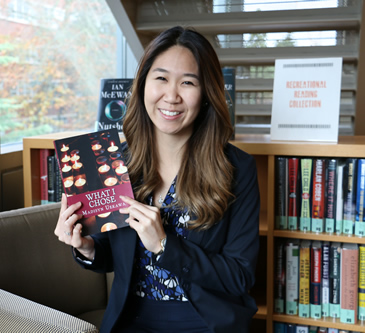
As an undergraduate at University of Hawaii, Madi Uekawa double majored in English and public health. That combination led her to become an author.
Uekawa's senior honors project was "What I Chose," a young adult fiction novella that is equal parts literature and suicide prevention. Shortly after starting law school, she decided to self-publish the book on Amazon to make it more accessible to readers and health educators.
"I saw it as a vehicle for health promotion," she said, adding that although she hasn't been personally impacted by suicide, she's known many people who struggled with mental illness. "The young adult readership correlates strongly with higher rates of suicide in Hawaii, and this is a way to reach that audience."
Uekawa's interest in public health policy and the ethics of health care is what led her to law school. She's now in her second year.
"I decided that helping the public on a broader level was a better fit for me than working with patients one on one," she said. "Law has such a broad impact." Uekawa was initially interested in health law but is considering several options for her legal career.
Uekawa's book tells the story of Kiara Rhodes, who transfers to University of Hawaii only to discover that her long-lost twin sister, Emma, had also been a student there but had died by suicide before Kiara arrived. As Kiara works through her own feelings of depression and self-harm, she discovers clues left behind by the sister she never knew. With help from friends, she's able to seek help before it's too late.
In telling Kiara's story, Uekawa intentionally uses a public health strategy known as "safe messaging." Safe messages about suicide emphasize hope and prevention, avoid graphic detail about a person's death, and encourage people to seek help. Another strategy is to avoid blaming a suicide victim by saying they "died by" suicide rather than that they "committed" suicide.
Uekawa said sometimes her goals as a writer conflicted with her goals as a public health advocate. For example, safe messaging avoids focusing on the personal details of a suicide victim's life. But as an author, Uekawa felt compelled to provide detail in order to humanize her characters.
As she finished her undergraduate education, Uekawa presented her honors project, gave a couple of talks at suicide awareness groups in Hawaii, and moved on to thinking about law school. But a suicide intervention specialist in North Carolina found her book via the University of Hawaii website and emailed her faculty adviser to ask if he could purchase and share the book. Her adviser encouraged her to self-publish and walked her through the process.
Uekawa donates all proceeds from sales of the book to the Hawaii chapter of the American Foundation for Suicide Prevention.
"I wanted to make it free but Amazon won't let you do that," she said "So I want people to feel like they're supporting the cause when they buy it."
Now that she's coping with the stress of law school, Uekawa said she still appreciates what she learned about mental health and suicide prevention. The Dave Nee Foundation estimates that rates of depression quadruple over three years of law school and lawyers are 3.6 times more likely than non-lawyers to suffer from depression.
"It's fine to need help. Law school is really tough," she said. "A big part of prevention is reaching out and getting help. I wish people were more open to it."
Note: Seattle University offers mental health resources for students who need help.
